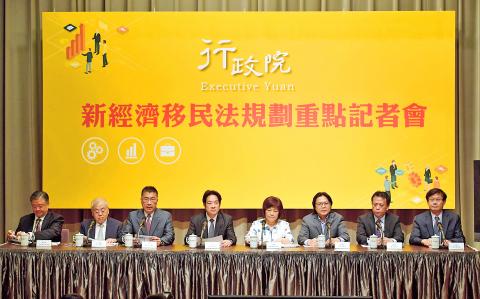The Cabinet yesterday proposed a draft act aimed at attracting foreign professionals, technicians, business immigrants and Taiwanese expatriates to supplement the nation’s labor pool.
With its declining birthrate and aging population, Taiwan would start to have negative population growth by 2025, Premier William Lai (賴清德) told a news conference at the Executive Yuan in Taipei, adding that the population is expected to decline from more than 23 million to fewer than 20 million by 2035.
As of August last year, the nation had a labor shortage of 218,000 people, excluding the agricultural sector, National Development Council Minister Chen Mei-ling (陳美伶) said, adding that it needed 120,000 more middle-level technicians.

Photo: CNA
The council proposed a draft act for new economic immigration to encourage more foreigners and Taiwanese expatriates to join the nation’s workforce, be they technicians, professionals or businesspeople, Chen said.
Foreign professionals who want to apply for permanent residency are required to stay in the nation for five consecutive years, but the bill proposes shortening the period to three years for special professionals, she said.
Special professionals are defined as those younger than 40 whose skills fit the nation’s key development industries, with an average monthly salary of NT$160,000, according to the draft act.
As for foreign technicians, the council would encourage overseas students and migrant workers to stay in Taiwan, but would only introduce them when the council considers it necessary, Chen said.
Migrant workers who have technical certificates would be allowed to stay in Taiwan after six years of work, but their monthly salary should meet certain standards — NT$41,393 for industrial workers and NT$32,000 for those in the social welfare and healthcare sectors, she said.
The council would have total control over the number of foreign technicians and impose personnel ratios on industries to ensure that foreign technicians supplement, rather than replace, the local workforce, she said.
The draft act would also loosen regulations for business immigrants as well as Taiwanese expatriates and their children returning to the nation.
The Executive Yuan expects to send the bill to the Legislative Yuan for review in the next legislative session, Lai said.
The council would continue to evaluate the bill’s potential risks and effects, Lai said, adding that the Cabinet would ensure new regulations do not affect the salaries of Taiwanese.
As for the labor shortage in the agricultural sector, the Council of Agriculture is promoting a working holiday program for young people from Southeast Asian nations, Deputy Minister of Labor Shih Keh-her (施克和) said.

MAKING WAVES: China’s maritime militia could become a nontraditional threat in war, clogging up shipping lanes to prevent US or Japanese intervention, a report said About 1,900 Chinese ships flying flags of convenience and fishing vessels that participated in China’s military exercises around Taiwan last month and in January have been listed for monitoring, Coast Guard Administration (CGA) Deputy Director-General Hsieh Ching-chin (謝慶欽) said yesterday. Following amendments to the Commercial Port Act (商港法) and the Law of Ships (船舶法) last month, the CGA can designate possible berthing areas or deny ports of call for vessels suspected of loitering around areas where undersea cables can be accessed, Oceans Affairs Council Minister Kuan Bi-ling (管碧玲) said. The list of suspected ships, originally 300, had risen to about 1,900 as

Japan’s strategic alliance with the US would collapse if Tokyo were to turn away from a conflict in Taiwan, Japanese Prime Minister Sanae Takaichi said yesterday, but distanced herself from previous comments that suggested a possible military response in such an event. Takaichi expressed her latest views on a nationally broadcast TV program late on Monday, where an opposition party leader criticized her for igniting tensions with China with the earlier remarks. Ties between Japan and China have sunk to the worst level in years after Takaichi said in November that a hypothetical Chinese attack on Taiwan could bring about a Japanese

MORE RESPONSIBILITY: Draftees would be expected to fight alongside professional soldiers, likely requiring the transformation of some training brigades into combat units The armed forces are to start incorporating new conscripts into combined arms brigades this year to enhance combat readiness, the Executive Yuan’s latest policy report said. The new policy would affect Taiwanese men entering the military for their compulsory service, which was extended to one year under reforms by then-president Tsai Ing-wen (蔡英文) in 2022. The conscripts would be trained to operate machine guns, uncrewed aerial vehicles, anti-tank guided missile launchers and Stinger air defense systems, the report said, adding that the basic training would be lengthened to eight weeks. After basic training, conscripts would be sorted into infantry battalions that would take

DEEP-STRIKE CAPABILITY: The scenario simulated a PLA drill that turned into an assault on Taiwan’s critical infrastructure, with the launchers providing fire support Taiwan yesterday conducted this year’s first military exercises at Longsiang Base in Taichung, demonstrating the newly acquired High Mobility Artillery Rocket System’s (HIMARS) ability to provide fire support and deep-strike capabilities. The scenario simulated an attack on Penghu County, with HIMARS trucks immediately rolling into designated launch areas and firing barrages at the Wangan (望安) and Cimei (七美) islands, simulating the provision of fire support against invading forces. The HIMARS are supposed to “fire and leave,” which would significantly increase personnel and equipment survivability, a military official said. The drill simulated an exercise launched by the Chinese People’s Liberation Army (PLA) Eastern